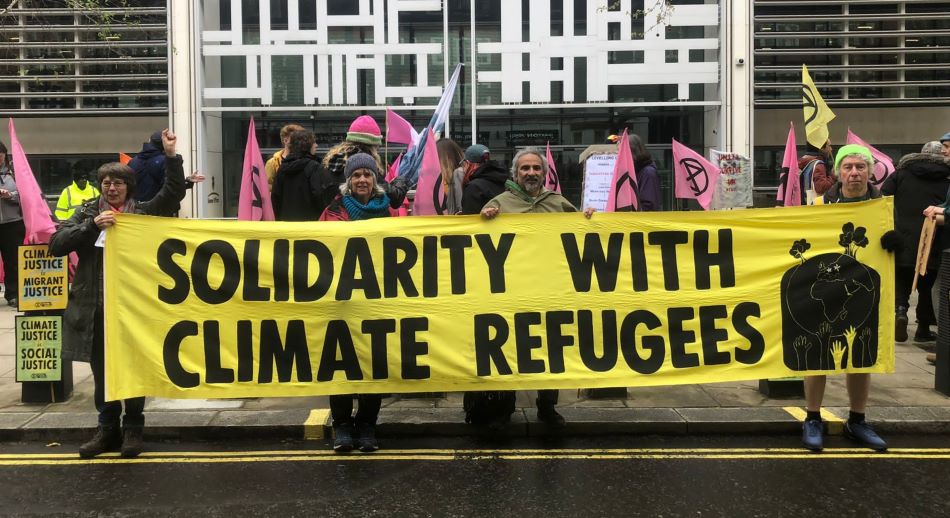Climate justice, refugees and human rights

We're joining a protest at the Home Office this Saturday 4th November, following Suella Braverman's inflammatory speech at the Conservative Party Conference where she suggested that the UK was facing a 'hurricane' of migration and that the government's policy on immigration had been hampered by being 'far too squeamish about being smeared as racist'.
What are the links between refugees and climate change?
An obvious connection is that people are forced to leave their home by climate breakdown. Most starkly, the very existence of Pacific island states is at risk from rising sea levels. In recent years, we have seen a regular series of climate disasters around the world, extreme weather events which would have been unlikely or impossible without fossil-fuelled climate breakdown. These can force thousands, or even hundreds of thousands from their homes temporarily. But the destruction of homes and livelihoods mean not all can return. Changing weather patterns also cause less visible changes: repeated crop failures from drought, floods or both; rising sea levels causing salinisation of farmland.
Some areas, such as the Sahel region of Africa, face both climate change and armed conflict. Exacly how resource scarcity and conflict are linked is debated, but one thing is clear: this is a deadly combination. From Honduras to Afghanistan, from South Sudan to the Rohingya refugees from Myanmar now in Bangladesh, climate breakdown exacerbates situations of violence and inequality. And consistently, those who have done least to cause the climate crisis are suffering worst from its impacts.
Another link is that both immigration and climate action are being used by this government to in an attempt to stoke a 'culture war' ahead of the 2024 general election. This has led to complete abandonment of rational policy-making. Braverman's plans for asylum-seekers, including deportation to Rwanda, combine cruelty with sky-high costs to taxpayers and as a whole are widely considered unworkable. On climate change Sunak is wooing backbenchers and right-wing media by taking a wrecking ball to the political consensus on the UK's legally binding climate targets, ignoring not just climate scientists but industry experts, businesses and public opinion polls.
In both cases the culture war approach is extremely dangerous not just for the damage caused by harmful policies, but for the long-term impact of associated propaganda narratives: immigrants and people 'not like us' are a threat; climate change is only a concern for middle-class 'eco-zealots' and we can't afford to take meaningful action against it.
Another important element in this culture war is the undermining of rights to protest and to free assembly, making these entirely dependent on arbitrary judgements made by the police and the Home Secretary. The goal is not to stop climate change but to stop climate protesters.
Perhaps most fundamentally, this government's attitude towards refugees and migration is the complete opposite of what is needed to avert the existential threat of climate change. As Naomi Klein said in her book, This Changes Everything, "In the hot and stormy future we have already made inevitable through our past emissions, an unshakeable belief in the equal rights of all people and a capacity for deep compassion will be the only things standing between civilization and barbarism."
No nation can avert climate catastrophe on their own: international climate action must depend on mutual trust, and above all on rich nations facing up to their historic responsibilities and greater capacity to act. The UK government's behaviour since hosting COP26 in 2021 has exemplified the hypocrisy and self-interest of wealthy countries: in its backtracking on climate action; in cutting the aid budget; in breaching international law by removing the right to claim asylum; and in evading humanitarian responsibility for refugees. This undermines everything the UK claimed to support at COP26.
What can we do as climate campaigners?
Globally, campaigns for climate justice support two key principles: the right to stay - to defend communities from the impacts of climate change, and the right to move - safely and with dignity, when staying is not possible. The failure of rich nations to provide meaningful climate finance, especially around adaptation, breaches human rights as does the 'fortress' approach to migration caused by climate breakdown, war and poverty.
Especially during UN climate negotiations such as the upcoming COP28 in Dubai, we can support the climate justice movement and countries most affected by climate change in the Global South fighting for the resources they need, holding rich nations to their financial responsibilities and speaking out against attempts to evade these, such as providing 'assistance' merely as loans.
When talking about those forced to move because of climate breakdown we should take care to avoid framing migration as a threat or endorsing a security-based response (Dangerous Narratives report).
And of course we can bring solidarity to campaigns for refugee and migrant rights and stand against hate and division, including racism, Islamophobia and antisemitism here in the UK.
Further reading
Intersecting justice: Climate Justice means Migrant Justice (Climate Justice Coalition)
Global Climate Wall: How the world’s wealthiest nations prioritise borders over climate action (Transnational Institute)
The Climate and Migration Coalition website
It is important to note that 'climate refugee' (as featured on the banner in the photo above) is not a recognised legal status. See for example p7 in the Dangerous Narratives report or How helpful is the term 'climate refugee'? for discussion of terminology.
Find out about the plight of those seeking asylum in the UK, for example from Refugee Action, Joint Council for the Welfare of Immigrants, Detention Action, Free Movement (hub for news and advice relating to immigration and and asylum law)


